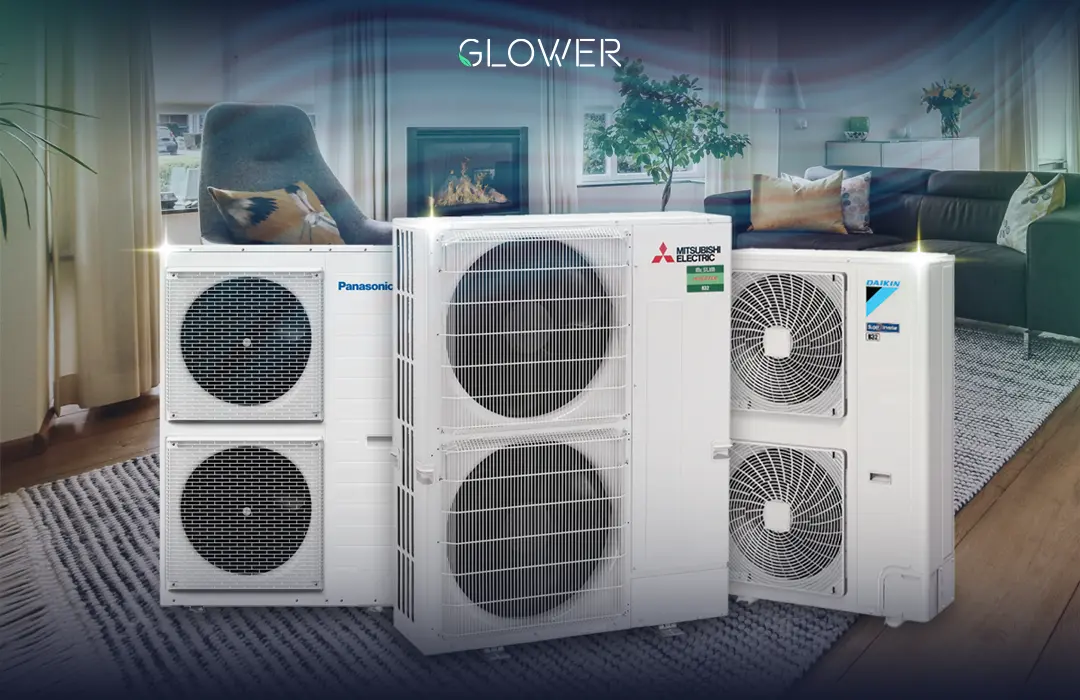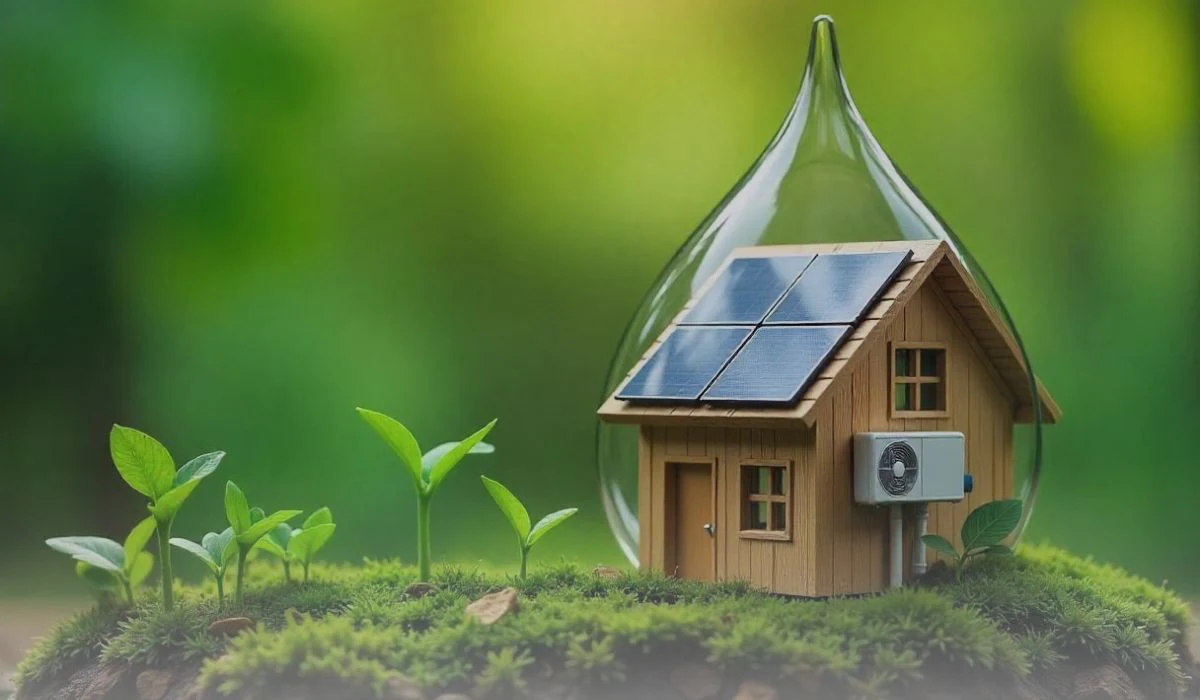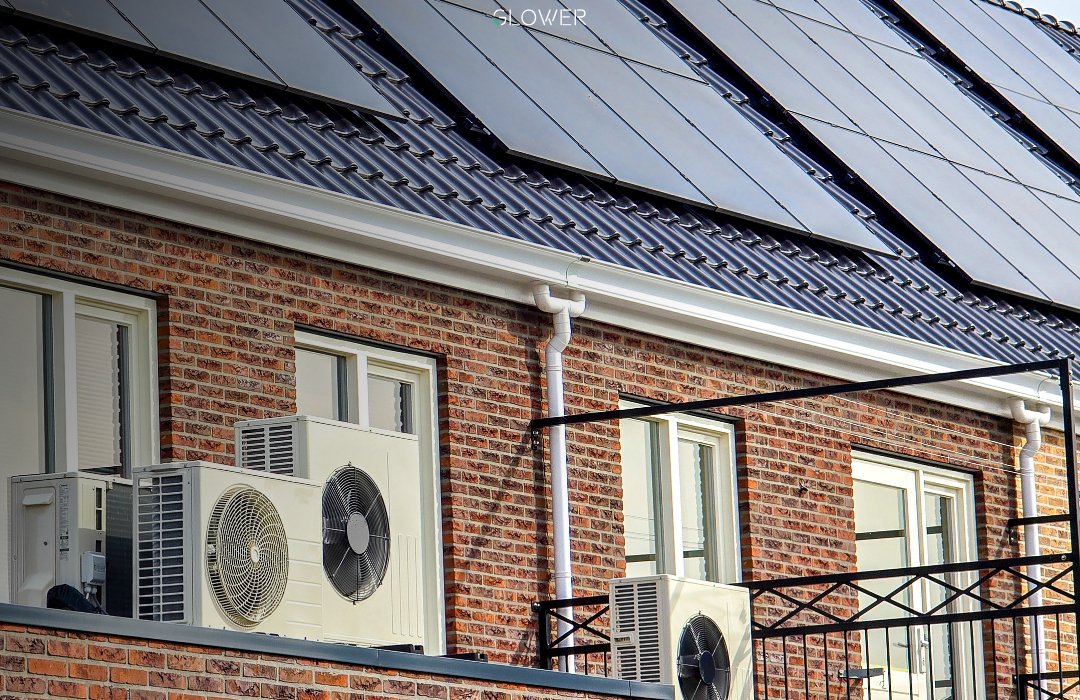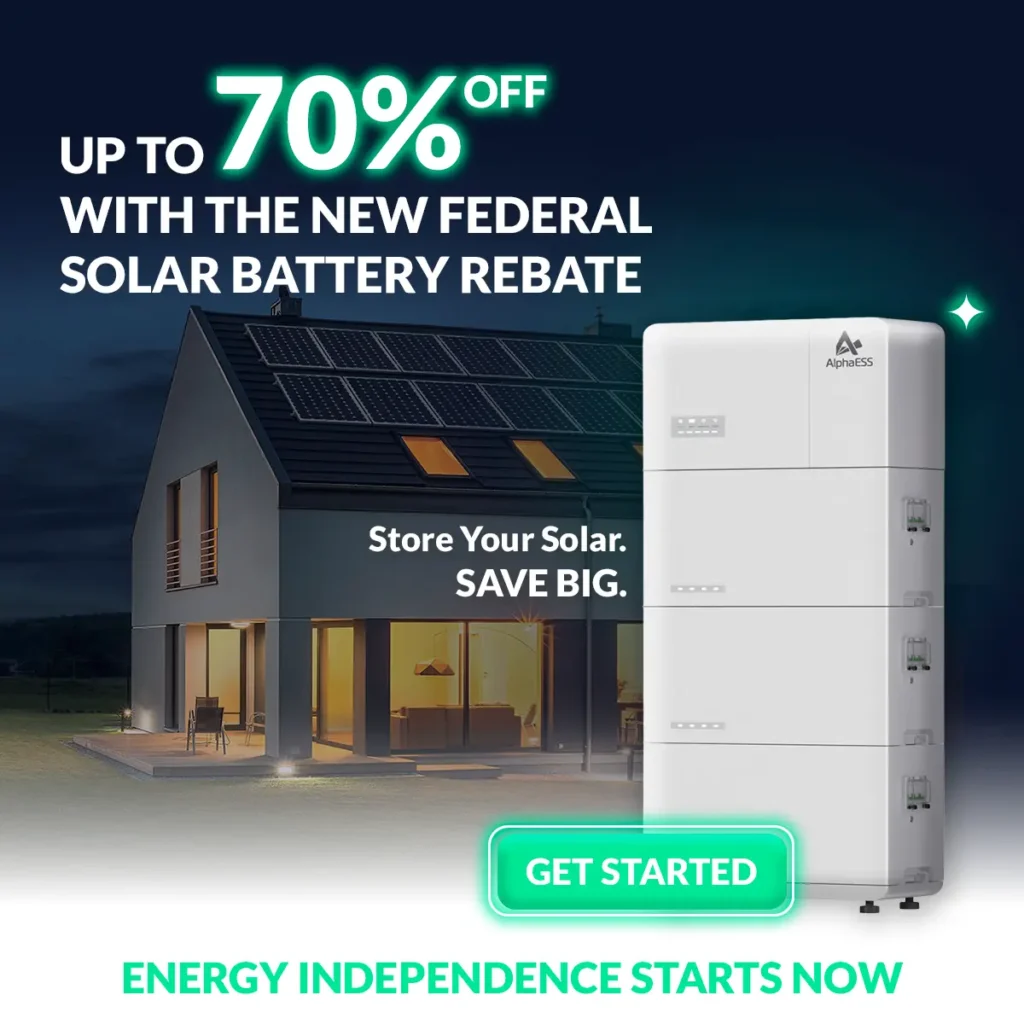Choosing the right air conditioning system for your home in Victoria can make a huge difference in comfort, energy costs, and indoor air quality. With energy-efficient options like Ducted and Multi Split ACs, you can stay cool in summer, warm in winter, and even enjoy cleaner, healthier air.
In this guide, we’ll answer the questions Victorians often ask: Are air conditioning units expensive to run? How do I choose the right size reverse cycle air conditioner? What should I consider before installing a new air conditioning system? Can they cause sinus problems or make you sick? Which air conditioning system is best? Plus, we’ll explain the benefits of reverse cycle air conditioning and show you why Glower’s energy-efficient systems are the smart choice for homes in Melbourne and Victoria.
What is Reverse Cycle Air Conditioning?
A reverse cycle air conditioning system is a versatile unit that provides both heating and cooling in your home. Unlike traditional air conditioners, which only cool the air, reverse cycle ACs can heat your home in winter while keeping it cool during summer. Therefore, they an energy-efficient solution for year-round comfort.
Victorians often ask, “Which air conditioning system is best?” The answer depends on your home size, layout, and needs. Ducted systems are perfect for whole-house climate control, offering even temperature distribution, while Multi Split ACs allow you to control individual rooms for flexibility and cost savings.
Additionally, modern reverse cycle ACs often include features like air purification and humidity control, which help reduce allergens and create a healthier indoor environment, something many homeowners in Melbourne are looking for.
Leading brands offering these features include Mitsubishi Electric, Hisense, Panasonic, Daikin, and Fujitsu, making it easier to enjoy comfort, cleaner air, and optimal humidity throughout the year.
How Do I Choose the Right Size Reverse Cycle Air Conditioner?
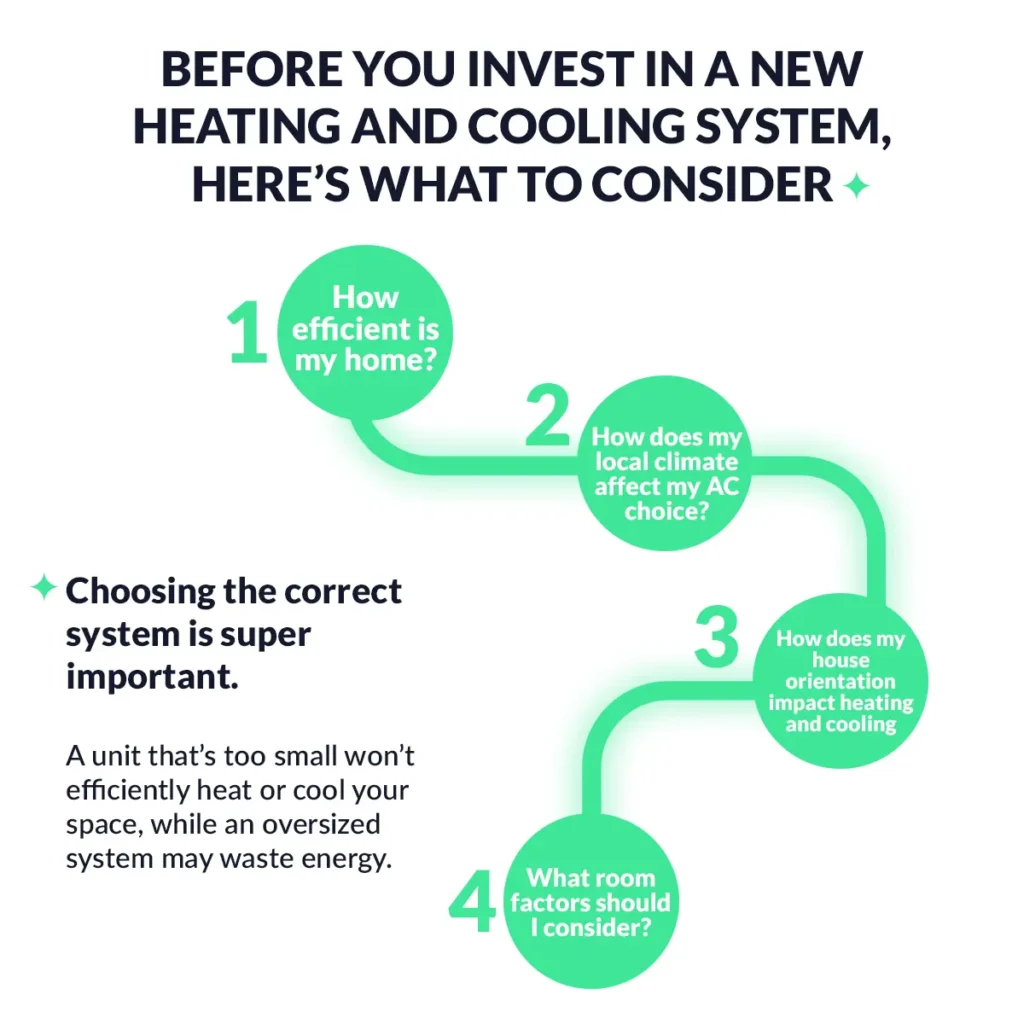
If you’re looking for an energy efficient AC in Victoria, choosing the right system can help cut running costs and improve comfort. The size of an air conditioner refers to its rated heating and cooling capacity, usually listed in kilowatts (kW). Reverse cycle ACs have both a heating and cooling size, which can be different.
Choosing the right size is crucial:
🏡 A system that is too small may struggle to heat or cool your home on the coldest or hottest days, taking longer to reach a comfortable temperature.
🏡 By contrast, an oversized system can cost more to purchase and run, may be less efficient, and can cause large temperature swings that reduce comfort.
🏡 Every household is unique, so the right size depends on your home layout, insulation, and energy needs.
What Should I Consider Before Installing a New Air Conditioning System?
Before investing in a new heating and cooling system, think about the efficiency and characteristics of your home:
How efficient is my home?
⚡️ Check for draughts around windows, doors, and vents. Sealing these can lower energy costs.
⚡️ Inspect insulation in walls, floors, and ceilings. Proper insulation reduces heating and cooling requirements.
⚡️ Consider your house construction (brick, weatherboard, etc.), which affects energy needs.
How does my local climate affect my AC choice?
⛅️ Victorian homes often use more energy for heating than cooling, so look for units with higher heating efficiency.
⛅️ Use the zoned energy rating label to compare efficiency for your climate.
⛅️ Ask your installer which models suit your location.
How does my house orientation impact heating and cooling?
🏠 Consider sun exposure and shade; it can reduce or increase heating needs.
🏠 Large single-glazed windows can cause heat loss in winter or heat gain in summer.
What room factors should I consider?
1️⃣ Size: Length, width, and ceiling height. Rooms above 2.4 m need more energy.
2️⃣ Airflow: Important if the system will serve multiple rooms.
3️⃣ Room priorities: Focus on primary living spaces like living rooms, family rooms, lounges, and open-plan areas. Covering too many or too few rooms can impact cost and comfort.
Are energy-efficient air conditioning systems expensive to run in Victoria?
Modern reverse cycle systems are among the most popular energy-efficient AC options in Victoria for homeowners. In fact, the costs depend on the type of system, its energy rating, and how it’s used.
Moreover, energy-efficient reverse cycle ACs, like Glower’s Ducted, Split and Multi Split systems, are designed to keep running costs low while maintaining comfort. These systems use advanced compressors and smart temperature controls to reduce electricity usage without compromising performance.
For example, a typical energy-efficient AC in a Victorian home may use between 1 to 3 kWh per hour, depending on the size of the unit and your usage habits. By contrast, choosing a high EER (Energy Efficiency Ratio) system and using timers or smart controls, homeowners can significantly reduce running costs.
Many Victorian households also benefit from government incentives and rebates for energy-efficient systems, further improving the value of upgrading to a modern AC.
See what Melbourne homeowners are saying about their energy-efficient ACs installed by Glower
How Do Energy Efficient AC Systems Improve Comfort and Air Quality?
Air conditioning isn’t just about temperature, it can also have a big impact on indoor air quality and comfort. Some homeowners worry that ACs might cause coughing, sinus problems, or make them feel unwell. The good news is that modern reverse cycle systems address these concerns.
Energy-efficient Ducted and Multi Split ACs often include air purification technologies and humidity control, which help:
- Reduce allergens, dust, and mould spores.
- Maintain optimal humidity levels, preventing dry air in winter and excess moisture in summer.
- Promote healthier indoor air, lowering the risk of respiratory irritation.
For example, brands like Mitsubishi Electric, Hisense, Panasonic, Daikin, and Fujitsu offer systems with advanced purification and dehumidifying features, making them a smart choice for Victorian homes where both comfort and air quality are top priorities.
By investing in a modern, energy-efficient AC, you not only stay comfortable year-round, but also protect your family’s health and enjoy better air quality indoors.
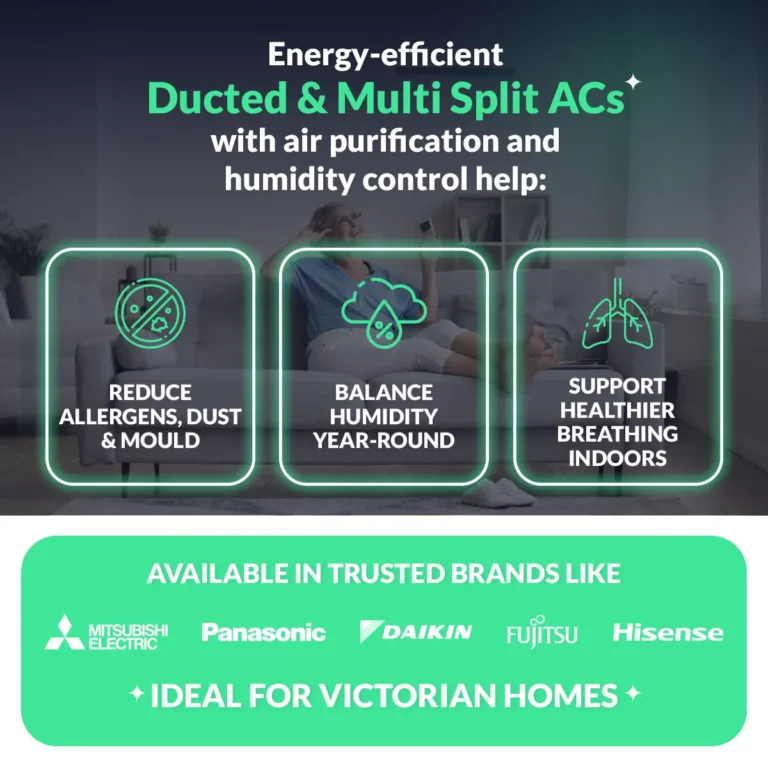
🚀📲 Take the next step towards a healthier, more comfortable home, check your eligibility now and get your customised AC quote. Find the perfect air conditioning solution for your lifestyle.
At Glower, we don’t just specialise in energy-efficient air conditioning. We also provide heat pump water systems, solar panels, and solar batteries, helping Victorian homeowners reduce energy costs and lower their carbon footprint.
Curious to learn more? Book a free consultation to discover how these technologies can work together to maximise efficiency and savings in your Melbourne home.
FAQ’s
Can AC improve indoor air quality?
Yes! Modern energy-efficient ACs, like Glower’s Ducted and Multi Split systems, often include air purification and humidity control. These features reduce allergens, dust, and mould spores, helping create a healthier indoor environment for your home in Victoria.
How do I choose the right size AC for my home?
Choosing the correct size depends on your home’s layout, number of rooms, and insulation. A system that’s too small won’t efficiently heat or cool your space, while an oversized unit may waste energy. Glower offers personalised consultations to recommend the right Ducted or Multi Split system for your home.
Are there rebates for energy-efficient ACs in Victoria?
Yes! Homeowners in Victoria may be eligible for government rebates when installing energy-efficient reverse cycle ACs. These incentives can help reduce upfront costs while promoting lower energy consumption. Check Glower’s latest options to see which systems qualify for rebates.

